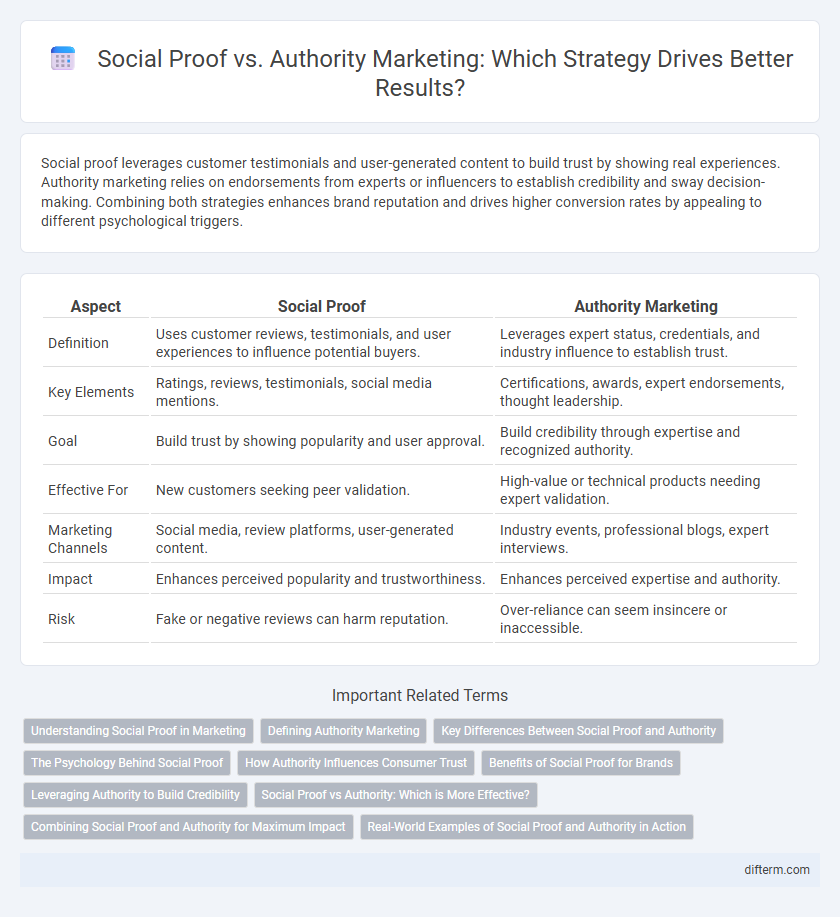Social proof leverages customer testimonials and user-generated content to build trust by showing real experiences. Authority marketing relies on endorsements from experts or influencers to establish credibility and sway decision-making. Combining both strategies enhances brand reputation and drives higher conversion rates by appealing to different psychological triggers.
Table of Comparison
| Aspect | Social Proof | Authority Marketing |
|---|---|---|
| Definition | Uses customer reviews, testimonials, and user experiences to influence potential buyers. | Leverages expert status, credentials, and industry influence to establish trust. |
| Key Elements | Ratings, reviews, testimonials, social media mentions. | Certifications, awards, expert endorsements, thought leadership. |
| Goal | Build trust by showing popularity and user approval. | Build credibility through expertise and recognized authority. |
| Effective For | New customers seeking peer validation. | High-value or technical products needing expert validation. |
| Marketing Channels | Social media, review platforms, user-generated content. | Industry events, professional blogs, expert interviews. |
| Impact | Enhances perceived popularity and trustworthiness. | Enhances perceived expertise and authority. |
| Risk | Fake or negative reviews can harm reputation. | Over-reliance can seem insincere or inaccessible. |
Understanding Social Proof in Marketing
Social proof in marketing leverages consumer behaviors and testimonials to build trust by showcasing real experiences and endorsements, influencing potential customers through social validation. Authority marketing relies on recognized experts or brands to establish credibility and persuade audiences by associating products with trusted figures or institutions. Understanding social proof is essential for marketers aiming to increase conversion rates by highlighting relatable user experiences and peer recommendations within target demographics.
Defining Authority Marketing
Authority marketing establishes a brand or individual as a credible expert by showcasing expertise, credentials, and authoritative content that builds trust with the target audience. It leverages thought leadership, certifications, and industry recognition to position the marketer as a reliable source, driving customer confidence and loyalty. Unlike social proof, which relies on customer endorsements and reviews, authority marketing creates influence through demonstrated knowledge and professional reputation.
Key Differences Between Social Proof and Authority
Social proof relies on user-generated content like reviews, testimonials, and peer endorsements to influence consumer behavior by demonstrating widespread acceptance or satisfaction. Authority marketing leverages endorsements from industry experts, influencers, or branded credentials to establish credibility and trustworthiness. The key difference lies in social proof's focus on collective validation versus authority marketing's emphasis on expert validation.
The Psychology Behind Social Proof
Social proof leverages the human tendency to conform by showcasing peer behaviors, driving trust and faster decision-making in marketing campaigns. Psychological triggers such as fear of missing out (FOMO) and validation through group consensus amplify the impact of testimonials, reviews, and user-generated content. In contrast to authority marketing, which relies on expert endorsements, social proof taps into social validation dynamics rooted in cognitive biases like social conformity and herd behavior.
How Authority Influences Consumer Trust
Authority marketing significantly enhances consumer trust by leveraging expert endorsements, industry certifications, and credible spokespersons to establish brand legitimacy. Consumers tend to perceive authority figures as knowledgeable and reliable, which reduces perceived risk and accelerates decision-making processes. In contrast to social proof, authority marketing creates a more stable foundation of trust by emphasizing expertise and established reputation.
Benefits of Social Proof for Brands
Social proof enhances brand credibility by showcasing real customer experiences and testimonials, which build trust and influence purchasing decisions. Brands leveraging social proof benefit from increased conversion rates and stronger customer loyalty as potential buyers feel reassured by peer validation. This marketing strategy effectively reduces skepticism and accelerates the decision-making process, driving higher engagement and sales.
Leveraging Authority to Build Credibility
Leveraging authority in marketing builds credibility by showcasing expertise and recognized credentials, which instills trust and confidence in the target audience. Authority marketing utilizes endorsements from industry leaders, certifications, and authoritative content to differentiate brands and influence consumer decisions. Establishing authority enhances perceived value and drives conversions more effectively than social proof alone.
Social Proof vs Authority: Which is More Effective?
Social proof leverages user-generated content, reviews, and testimonials to build trust by showing real customer experiences, making it highly effective in influencing purchase decisions. Authority marketing relies on establishing a brand or individual as an expert through credentials, endorsements, and thought leadership, which can create long-term credibility but may feel less relatable. Studies indicate social proof tends to drive higher conversion rates due to its authenticity and perceived impartiality, while authority marketing strengthens brand positioning in competitive markets.
Combining Social Proof and Authority for Maximum Impact
Combining social proof and authority marketing leverages customer testimonials, reviews, and influencer endorsements alongside expert credentials and brand reputation to enhance credibility and trust. Integrating user-generated content with authoritative messages amplifies persuasion by validating claims through both peer validation and expert approval. This strategic mix drives higher engagement, conversion rates, and long-term brand loyalty in competitive markets.
Real-World Examples of Social Proof and Authority in Action
Brands like Amazon leverage social proof through customer reviews and ratings, boosting trust and purchase rates by showcasing authentic user experiences. Authority marketing shines in Apple's strategy, where expertise and innovation leadership are highlighted via expert endorsements and industry awards, reinforcing brand credibility. Combining real-world social proof with authoritative signals effectively influences consumer decisions and enhances brand loyalty.
Social proof vs authority marketing Infographic

 difterm.com
difterm.com